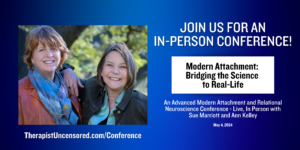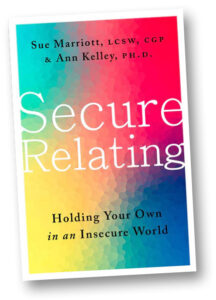Podcast: Play in new window | Download (Duration: 1:00:52 — 139.3MB)
Subscribe: Apple Podcasts | Spotify | Amazon Music
Meet some of our previous guests at the virtual launch May 1, 2024!
Pre-order now to meet David Elliott, Carol George, Tina Payne Bryson and many more!
Click here to learn more about the conference!!
Don't catch the certainty virus!
Collective trauma requires collective healing
We can understand our social pain by considering the nervous system, just think of it as a collective amygdala hijack! Threat is pressing us to live in an alarm state and then we get used to it, as if it's normal to be so divided, hopeless and disdainful to those who are holding different positions in the world. We need to cultivate secure (mature) relating to move ourselves back into a social, relational place that makes us more generous, compassionate and able to work with complexity to stay engaged to solve some of these pressing world and community issues. Keep hope alive!
Ann and Sue delve into the pressing emotional and social challenges confronting our world today. They examine the impact of divisive political rhetoric, the ongoing COVID-19 pandemic, collective distrust, and widespread trauma on individuals and society as a whole. Emphasizing the necessity of self-awareness and accountability, they underscore the role each person plays in contributing to collective healing and regulation. Throughout their conversation, Ann and Sue stress the importance of vulnerability, genuine connection, and the pursuit of healing as essential components of addressing systemic issues and promoting relational solutions. They also tackle the complexities of polarization, advocating for open-mindedness, nuance, and empathy in navigating ideological differences and fostering constructive dialogue. Explore the transformative potential of emotions like anger and the power of connection and love in driving positive societal change.
pursuit of healing as essential components of addressing systemic issues and promoting relational solutions. They also tackle the complexities of polarization, advocating for open-mindedness, nuance, and empathy in navigating ideological differences and fostering constructive dialogue. Explore the transformative potential of emotions like anger and the power of connection and love in driving positive societal change.
“…if you can get your mind and your body connected and be deliberate about your actions, you're going to bemore powerful” – Sue Marriott
1:42 – Reflecting on current events and polarization
4:40 – Sue’s bug analogy from the book
7:55 – Understanding our reactivity
10:15 – We have to go inward and look inward
15:25 – Ann’s anecdote of sitting with the discomfort
17:44 – Tools to “hang in there” and to try to stay regulated
18:46 – Explanation of the “certainty virus”
30:17 – Taking responsibility for our part
32:23 – The need for vulnerability and safety
35:15 – Cultivating safety around you
37:55 – Letting anger inform
48:34 – Holding our own individually and collectively
50:46 – Keeping hope alive
58:31 – Recognizing the signs of collectiveness and collective activation

Please consider giving to Mental Health Liberation
We support mental health access to those traditionally left out of mainstream healthcare and use a portion of the income we receive from corporate sponsors to do just that! We can only do that with the help of our Patrons – joining as a TU Neuronerd Podsquad premium subscriber, you support this mission and get a dedicated ad-free feed plus occasional very cool and unique study opportunities, reading groups, and unique surprises! We invite you to join our community. Click here to join!
Mental Health Liberation is our primary partner at this time – please consider giving whatever you can to support mental health access for those traditionally left behind and support training for BIPOC therapists.
Support the show by supporting our partners and the sponsors of today's episode!

Go to Zocdoc.com/TU
















